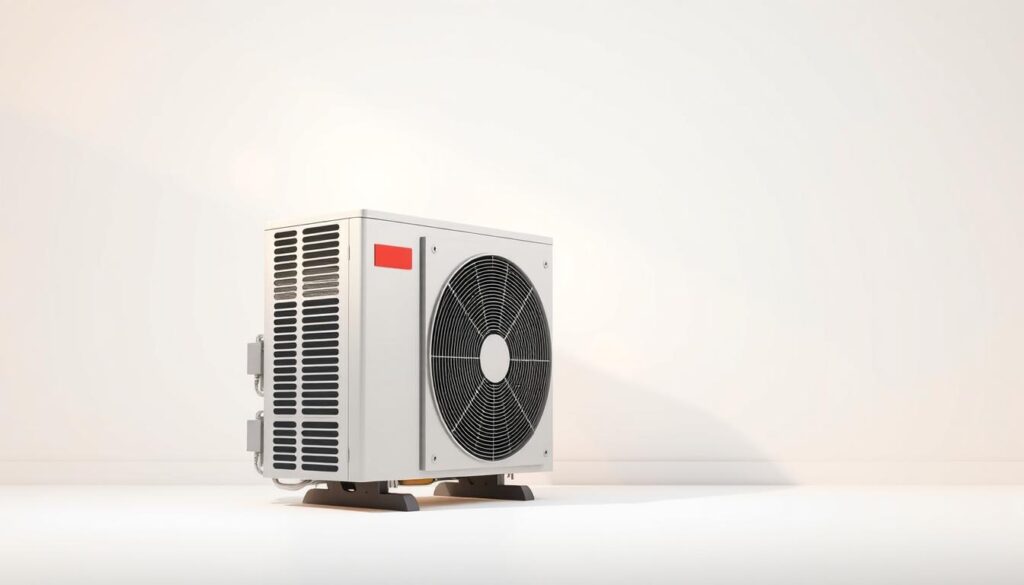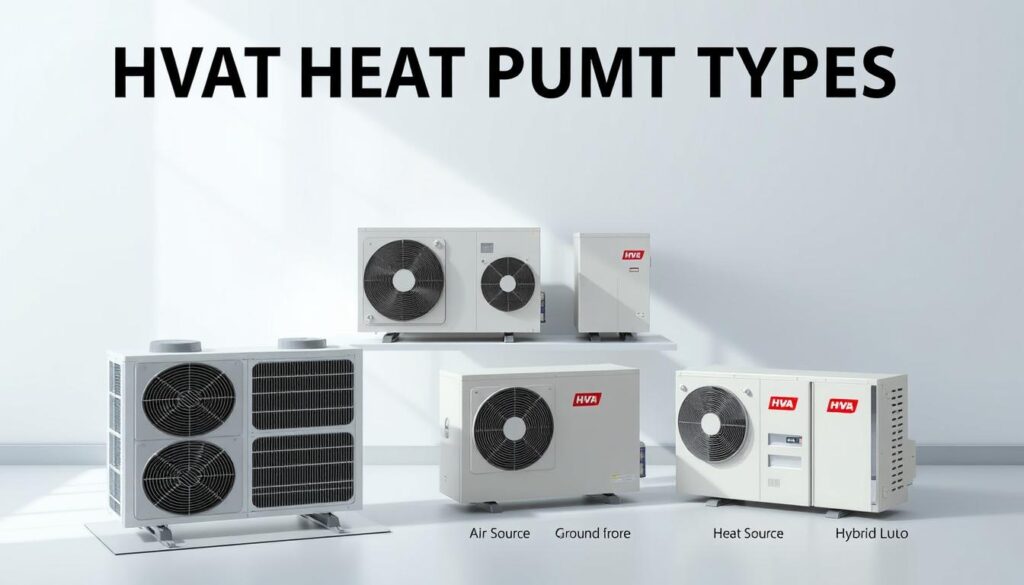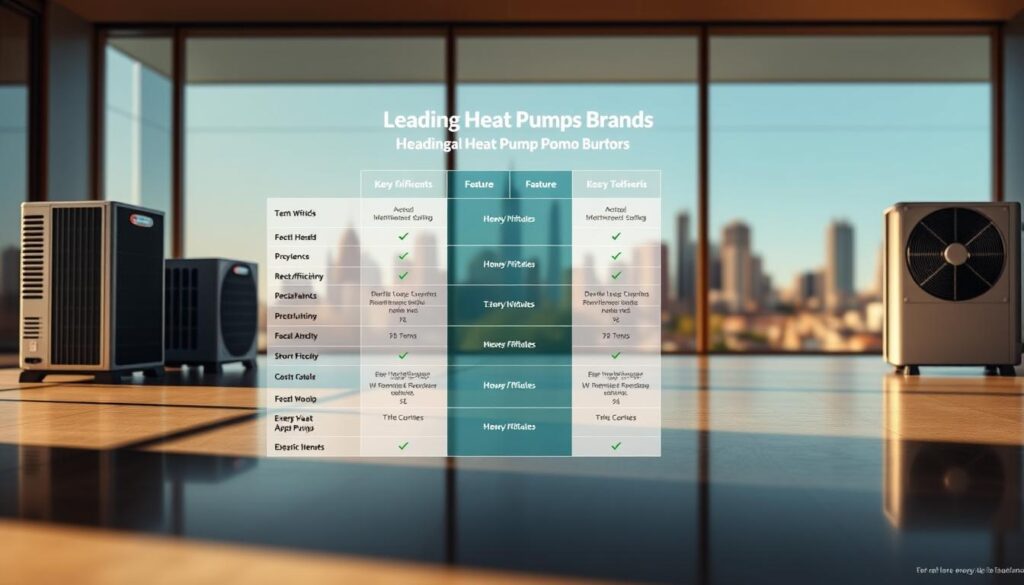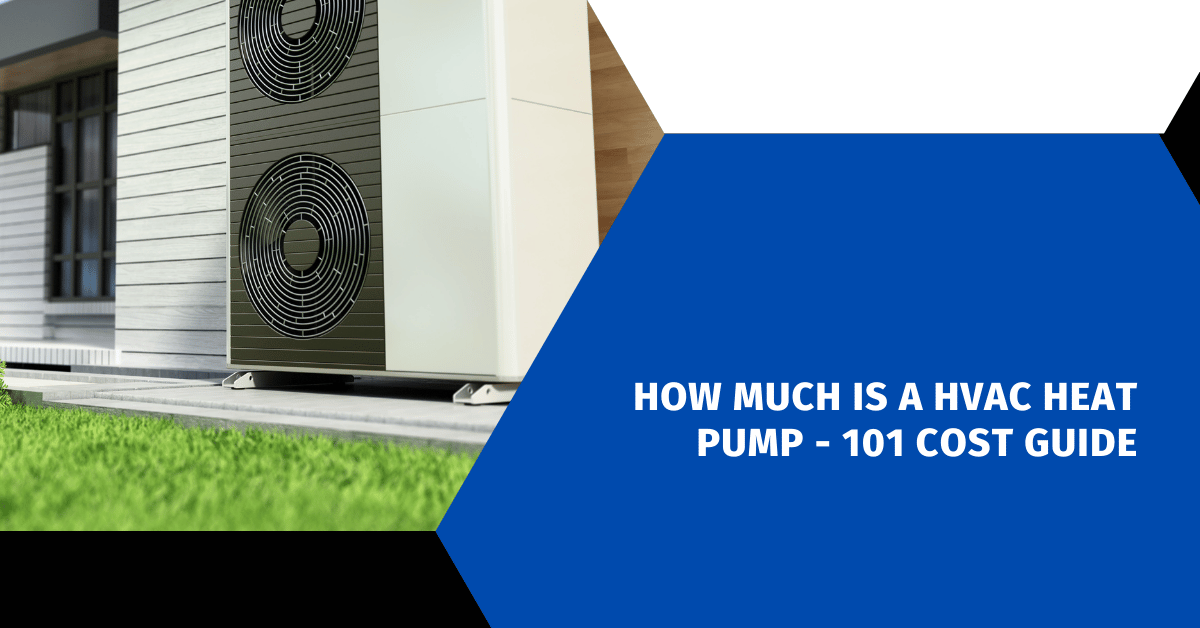Affiliate Disclosure
HVAC Guide Guys is a participant in the Amazon Services LLC Associates Program, an affiliate advertising program designed to provide a means for sites to earn advertising fees by advertising and linking to Amazon.
How Much Is a HVAC Heat Pump? Are you fed up with high energy bills? Wondering if a heat pump could save you money and make your home more comfortable? It’s important to know how much a heat pump costs before you decide to upgrade your heating and cooling systems.

Heat pumps are a modern way to control your home’s temperature. They use less energy than old heating systems. When you look into the cost of a HVAC heat pump, you’ll find many things affect the price.
The cost of a heat pump changes based on the type, your home’s size, and how hard it is to install. This guide will help you understand the costs. You’ll learn how to choose wisely, balancing the initial cost with the savings you’ll get over time.
Key Takeaways
- Heat pumps consume less electricity than conventional heating systems
- Prices range significantly based on home requirements
- Energy efficiency can lead to substantial long-term savings
- Professional assessment is key for accurate heat pump sizing
- Many financing and incentive options are available for installations
Table of Contents
Understanding Heat Pump Basics and Energy Efficiency
Heat pumps are a new way to heat and cool your home. They don’t make heat like old systems do. Instead, they move heat from outside in. This makes them a smart choice for saving money on heating and cooling costs.
Heat pumps work in a clever way. They take heat from the air, ground, or water outside and move it into or out of your home. In winter, they bring warmth in. In summer, they take heat out.
How Heat Pumps Transfer Energy
The energy transfer process has three main parts:
- An evaporator that absorbs heat
- A compressor that makes heat stronger
- A condenser that puts heat where you want it
Energy Efficiency Ratings Explained
Two important ratings are SEER and HSPF. Higher numbers mean better efficiency and more savings.
Comparison with Traditional Heating Systems
Old furnaces burn fuel to make heat, which isn’t as efficient. Heat pumps just move heat, using much less energy. This means lower bills and less harm to the environment for those looking for green heating options.
How Much Is a HVAC Heat Pump: Complete Cost Breakdown
Homeowners looking to upgrade their HVAC system need to know the heat pump installation cost. The price of a hvac heat pump varies a lot. This is because of many different factors.
The cost for a heat pump system for a standard single-family home is usually between $6,000 and $12,000. This price includes several important parts:
- Equipment purchase
- Professional installation
- Additional materials
- Necessary modifications to existing ductwork
The total cost of installing a heat pump depends on a few key things:
- System capacity: Bigger homes need stronger units
- Equipment quality: Better models cost more at first
- Regional labor rates: Prices for installation change by area
- Home infrastructure: What’s already there affects the cost
Professional HVAC contractors can give you a detailed estimate for your home. Getting quotes from different contractors helps you understand all the costs involved.
Explore Our HVAC Shop
Looking for top-rated HVAC tools, parts, and accessories? Visit our shop and find the perfect solution for your needs.
Visit the ShopHeat Pump Size and Capacity Considerations
Choosing the right heat pump for your home is key for comfort and saving on hvac costs. The size and capacity of your heat pump affect its performance and energy use. This, in turn, impacts your home upgrade expenses.
Getting the right heat pump size involves looking at several factors. Your home’s unique features are important in picking the best system.
Calculating Home Square Footage Requirements
To find the right heat pump size, consider these elements:
- Total square footage of your living space
- Ceiling height
- Home insulation quality
- Number of windows and doors
- Local climate conditions
BTU Ratings and Coverage Areas
BTU ratings show a heat pump’s cooling and heating power. Here’s a quick guide:
| Home Size (sq ft) | Recommended BTU Range |
|---|---|
| 500-700 | 9,000-12,000 BTU |
| 700-1,000 | 12,000-15,000 BTU |
| 1,000-1,500 | 15,000-22,000 BTU |
Impact of Climate Zones on Sizing
Your local climate affects heat pump sizing. Colder regions need more powerful systems to keep your home warm.
Professional HVAC contractors can do a detailed load calculation. They help you choose the best heat pump for your home. This saves on costs and keeps your home comfortable.
Types of Heat Pumps and Their Price Ranges

Choosing the right heat pump for your home means knowing the different types and their costs. Each system has its own benefits and prices. These can greatly affect your total investment.
Air-source heat pumps are the most common and affordable choice. They cost between $4,000 and $8,000. They work well in mild climates, pulling heat from outside air to warm your home in winter and cool it in summer.
- Geothermal heat pump costs are substantially higher, ranging from $10,000 to $25,000
- Ductless mini split heat pump costs average between $3,000 and $10,000
- Hybrid heat pump systems can run $6,000 to $12,000
Ductless mini split heat pumps are great for homes without ducts. They cost between $3,000 and $10,000. Geothermal systems are pricier but save energy in the long run by using underground temperatures.
Your home’s setup, local weather, and energy needs will guide your choice. Talking to a professional HVAC technician can help you find the best option for your budget and needs.
Explore Our HVAC Shop
Looking for top-rated HVAC tools, parts, and accessories? Visit our shop and find the perfect solution for your needs.
Visit the ShopInstallation Costs and Labor Expenses
Knowing the cost of heat pump installation is key for homeowners. It’s important to understand the different parts that affect your budget.
When you get a heat pump installed, you’ll face several costs. These costs include:
- Labor rates
- Permit fees
- Additional installation materials
- Equipment preparation
Permit and Inspection Requirements
Getting the right permits is a must for heat pump installation. In places like California, you need a Mechanical, Electrical, and Plumbing (MEP) permit. Without it, you could face:
- Big fines
- Insurance problems
- Forced inspections later
Labor Rate Variations
The cost of HVAC unit replacement changes with labor rates in your area. Cities usually cost more than rural areas. Technicians charge between $75 to $250 per hour, based on where you live.
Additional Installation Materials
You’ll also need extra stuff like refrigerant lines and electrical connections. These can cost $500 to $1,500 extra.
Remember to plan for extra costs. Make sure to hire licensed pros who know local rules and permits.
Heat Pump Brands and Price Comparison

When looking at heat pump prices, you’ll see many brands with different features and costs. Top names like Carrier, Trane, and Lennox offer high-end options with the latest tech.
Here are some key brands to think about for your heat pump:
- Carrier: Known for high-efficiency models with intelligent comfort controls
- Trane: Offers robust systems with exceptional durability
- Lennox: Delivers top-tier energy-efficient heat pumps
- Rheem: Provides cost-effective solutions for budget-conscious homeowners
Heat pump prices vary due to several important factors:
- Advanced technological features
- Energy efficiency ratings
- Cooling and heating capacity
- Brand reputation
The cost of your hvac system depends on the model’s complexity and performance. High-end heat pumps with advanced tech can cost between $5,000 and $12,000, including installation.
Pro tip: Always compare manufacturer warranties and seek professional consultation to match your specific home requirements.
Choosing the right heat pump is about finding the right balance between performance, efficiency, and cost. Do your research and think about long-term energy savings when you decide.
Explore Our HVAC Shop
Looking for top-rated HVAC tools, parts, and accessories? Visit our shop and find the perfect solution for your needs.
Visit the ShopFactors Affecting Total Heat Pump Costs
When looking into how much a hvac heat pump costs, it’s important to know what affects the price. Your home upgrade isn’t just about the cost of the equipment. It’s about how different elements come together.
Several key factors can greatly change your heat pump installation costs:
- Seasonal timing of installation
- Geographic location and climate
- Specific home configuration
- Existing HVAC infrastructure
Seasonal Installation Dynamics
When you install your heat pump matters a lot. Installing during peak seasons like summer and winter can be expensive because of high demand. Installing during less busy times can save you money.
“Strategic timing can reduce your installation expenses by up to 20%.” – HVAC Industry Experts
Geographic Location Considerations
Your area’s weather affects the cost of a hvac heat pump system. Places with extreme temperatures need stronger systems, which costs more. Coastal areas might need special equipment to fight corrosion, and northern areas need systems that can handle cold better.
Home Configuration Impact
Your home’s special features can change how hard it is to install and how much it costs. Things like how big your home is, how well it’s insulated, and its design can all affect the price.
- Older homes may require additional modifications
- Multi-story buildings might need zone-specific solutions
- Energy-efficient homes could reduce overall system requirements
Knowing these important factors can help you choose wisely. You can find a balance between how well it works, how efficient it is, and what it costs for your heat pump.
Maintenance and Repair Cost Expectations
Knowing the costs for maintaining and repairing energy efficient heat pumps is key for homeowners. These systems need regular care to work well and avoid costly repairs.
Costs for maintenance can vary a lot. Repair prices range from $15 to $4,500. Several factors affect the price:
- Type of repair needed
- Size and complexity of the heat pump unit
- Age of the system
- Seasonal timing of maintenance
Regular maintenance can save you money in the long run. Annual professional inspections cost $100 to $300. They can save you thousands on repairs or replacements.
Common issues that raise repair costs include:
- Refrigerant leaks
- Compressor failures
- Electrical component malfunctions
- Thermostat replacements
Choosing high-quality, energy efficient heat pumps can lower repair needs. Regular maintenance helps catch problems early. This keeps your system running well.
Energy Savings and Return on Investment
Investing in energy efficient heat pumps can change your home’s heating and cooling costs. These systems move up to 300 percent more energy than they use. This means big savings for homeowners over time.
When looking at heating and cooling prices, heat pumps are a wise choice. Your savings depend on several things:
- Local climate conditions
- Current energy rates
- Home insulation quality
- System efficiency rating
The upfront cost might seem high compared to old HVAC systems. But, the yearly energy savings can pay for it in a few years. You could save 30% to 50% on your bills compared to old heating methods.
To get the most from your investment, try these tips:
- Choose a high-efficiency heat pump model
- Get it installed by pros
- Keep your system in good shape
- Save energy in other ways too
Smart homeowners see heat pumps as a smart choice for both comfort and saving money.
Your exact savings will depend on many factors. But, many families get their money back in 5-10 years from lower energy bills. Talking to local HVAC experts can give you a better idea of what you might save.
Explore Our HVAC Shop
Looking for top-rated HVAC tools, parts, and accessories? Visit our shop and find the perfect solution for your needs.
Visit the ShopAvailable Rebates and Tax Incentives
Lowering the cost of installing a heat pump is easier than you think. The U.S. has many financial incentives for homeowners. These can greatly reduce the cost of a high-efficiency heat pump system.
The federal government and state agencies offer big help for energy-saving home upgrades. Key incentives include:
- Federal Inflation Reduction Act tax credits up to $2,000 for heat pump installations
- State-level rebate programs targeting energy-efficient home upgrades
- Local utility company incentives for sustainable heating solutions
Some states, like California, really support heat pump technology. They’ve made electric heat pumps the standard for new buildings. This gives homeowners more financial reasons to choose them.
| Incentive Type | Potential Savings | Eligibility |
|---|---|---|
| Federal Tax Credit | Up to $2,000 | ENERGY STAR certified heat pumps |
| State Rebates | $500-$1,500 | Varies by state regulations |
| Utility Incentives | $300-$1,000 | Local utility service area |
To save the most, look into programs in your area. Talk to local utilities, state energy offices, and tax experts. They can help you find out which incentives you qualify for when you plan to install a heat pump.
“Investing in energy-efficient home upgrades isn’t just good for the environment—it’s smart financial planning.” – U.S. Department of Energy
With the right planning and research, you can cut down the cost of installing a heat pump. This makes upgrading your home’s HVAC system more affordable.
Conclusion
Choosing a heat pump system is a smart move for homeowners wanting efficient heating and cooling. Knowing the cost of a hvac heat pump means looking at several things. These include the price of installation, how efficient the system is, and how much you’ll save in the long run.
Heat pumps that save energy are great for cutting down on bills. Your home’s layout, the weather in your area, and your heating and cooling needs will help pick the best system. This choice is important for your home’s comfort.
Getting help from HVAC experts is key when picking and setting up a heat pump. They can guide you through the process, from choosing the right size to finding rebates. With their help, you’ll get the most out of your investment in new heating and cooling tech.
A well-thought-out heat pump installation can bring comfort for years and big energy savings. Take your time to learn, talk to experts, and choose wisely. This way, you’ll meet your home’s needs and your financial goals.

